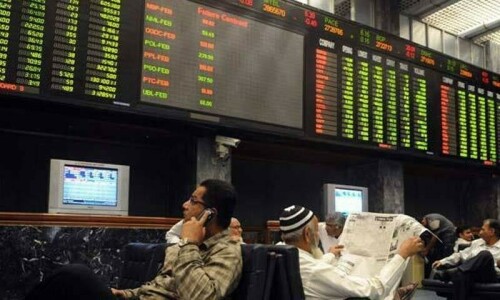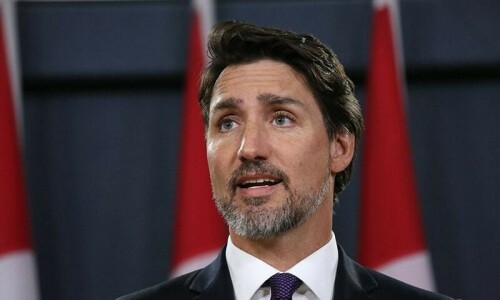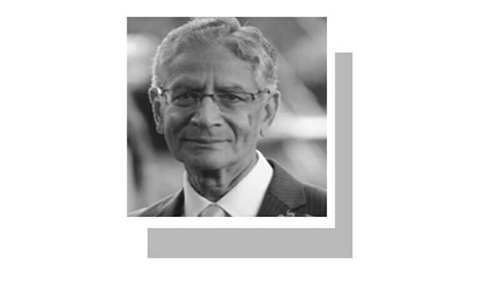IN the recent series of meetings with the country’s businessmen, Prime Minister’s Advisor on Finance Shaukat Tareen indicated that he had no option but to seek balance of payment support from the IMF.
Needless to say, the IMF’s credit facility carries a price tag that is likely to push up energy costs and interest charges, considered too telling for the manufacturing sector.
Anticipating a possible agreement with the IMF, the President of the Federation of Pakistan Chambers of Commerce and Industry, Mr Tanveer Sheikh, minced no words to remind Mr Tareen on October 25 of “anti-industrialisation clauses of the IMF agreements’’ concluded in the past.
This situation of a conflicting stance — between the government and the industrialists — has emerged at a time when the government, on more than one occasion, has talked about a shift in strategy from “consumption-led to production-led growth’’.
Official figures show a five per cent decline in large-scale manufacturing during July-August. According to a data compiled by the Federal Bureau of Statistics, the production of yarn, cloth, refrigerators, deep freezers, air conditioners, electric bulbs, electric motors, tv sets, bicycles and many others items, is down.
With slump in manufacturing, trade deficit in the first quarter has also widened to over $5 billion- a source of deep concern to decision-makers in Islamabad. One set of business leaders in Karachi is however convinced that economic situation is now showing some signs of improvement as international oil and commodity prices have started coming down steeply.
“There is no need for the government to seek IMF assistance at all’’, argues Zubair Motiwala, a former President of Karachi Chamber of Commerce and Industry who met President Asif Zardari late last month with a few other business representatives. He reckons that the import bill for 2008-09 should be lower at $30 billion against $40 billion last year. He expects exports to be somewhere around $24-25 billion this year, if the government takes right measures. Trade imbalance in the current fiscal year should be in the range of $6-8 billion as against $20 billion in 2007-08. Remittances are already on the rise and if the government responds to a suggestion given by Karachi business leaders to the President last week to offer the open market exchange rate to those (overseas compatriots) individually remitting more than a thousand dollars a month, should increase this inflow to $8-10 billion a year.
“We are certainly under some stress but not in distress,’’ asserts Zubair who wants the government to hedge oil purchase prices in international market for at least six months. “Give us energy prices (oil, gas and electricity tariff) that is valid for at least next six months so that we exporters can quote competitive prices of our products to our foreign buyers’’, he pleads. “Sharp fluctuations in energy prices keep us indecisive and tentative round the year and we miss orders,’’ he said. Businessmen in Karachi expect the government to give them some concession in energy tariff, supply support and some cut in bank rates, “so that we can generate a few billion more dollars of exports”. “Let me tell you that quite a few import substitution industries in Karachi have started showing signs of revival after the government put a curb on import of 389 items’’, revealed Zubair Motiwala. Businessmen in Karachi argue for support of domestic industry even by curbing imports, as what they say India and China also do in different ways. “I can feel a deep desire among senior government personnel for a shift to production-led growth,’’ said Mr Shafqat Elahi Sheikh, a senior leader of All Pakistan Textile Mills Association (APTMA) in Lahore who heads Energy Committee and is involved in consultation with the task force on energy tariff headed by Ms Hina Rabbani Khar.
Many industry leaders endorse Mr Elahi’s observation on the government’s desire to promote productive sectors, industry and agriculture, but are waiting for required policies and facilities.
“The global economic crisis is going to eliminate any textile capacity still operating in the West and will downsize textile capacity in the countries like Turkey,’’ Shafqat informed Ms Hina Rabbani Khar during a recent meeting asserting that, “this is a rare window of opportunity for increased textile exports’’. But his point is that “we can only export what we can produce’’, and he pleads for an enabling environment in which the textile industry operates at optimum capacity to utilise 16 million bales of cotton.
In Northern areas, the government has indicated availability of additional gas of 200 MMCFD. A similar case has been made out by the textile units in Punjab. Initially, the indication was that this additional gas would be given to Punjab’s industry for electricity generation. But then, certain government circles have dropped hints of giving this gas to PEPCO. Industry leaders contend that the efficiency of their electric power generators is much better than PEPCO. PEPCO suffers from huge line losses which is insignificant in captive power plants installed in the industrial premises.
They maintain that PEPCO’s subsidiary distribution companies recover hardly 75-80 per cent of their monthly billing. In fact, for PEPCO, it is an all round losing business. The industry’s conversion cost is much less than that of PEPCO. This will enhance industrial production, mainly in textile sector. The manufacturing sector is also eyeing the liquidity injected by the State Bank of Pakistan into the banking system. Also in the run are powerful stock brokers who want billions to be pumped in bourses to reactivate trading of shares.
The FPCCI President, Mr Tanveer Sheikh, while welcoming Mr Tareen to FPCCI on October 25 opposed any move to divert liquidity to “maintain stock market indicators’’ and called it, “risky and fraught with dangers”. ‘’Prudence and economic wisdom are required for proper utilisation of the banking resources to improve investment and industrialisation to curb unemployment, inflation and poverty’’, he told the PM’s advisor on finance. Business still waits for some positive signals from Islamabad for the commodity sectors-- the real productive sectors-- to get the required support. There is still an air of uncertainty.
















































